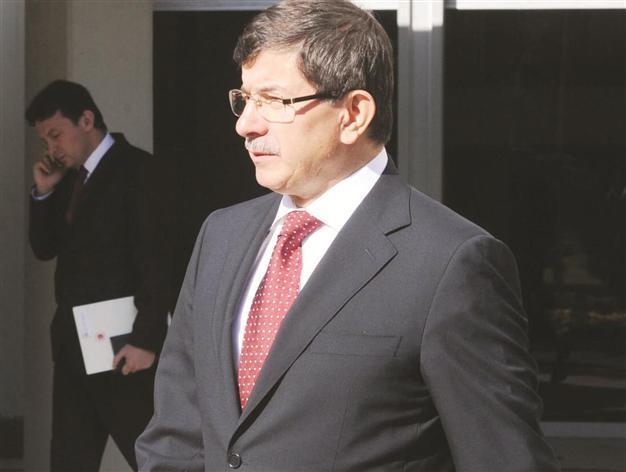Aleppo won't be another Halabja, Turkey says
ANKARA - Hürriyet Daily News

Daily News Photo by Selahattin Sönmez
Turkish troops may intervene at the Syrian border in a move to protect the large number of fleeing Syrians from an armed attack by regime forces, the Turkish foreign minister has said, calling on the United Nations and the international community to take up responsibility on their end.
“If tens of thousands attempt to flee
Turkey and Syrian forces open fire on them, neither Turkey nor the whole world can remain silent to such a situation,” Foreign Minister Ahmet Davutoğlu told Ankara newspaper bureau chiefs at a fast-breaking dinner late July 29. Davutoğlu recalled the United Nation’s duty to protect civilians in armed clashes as part of the Security Council’s earlier resolutions on the matter, in a phone conversation with UN Secretary-General Ban Ki-moon July 29.
Turkey could do nothing to stop the 1988 Halabja massacre by the Saddam Hussein administration, in which nearly 5,000 Iraq Kurds were killed by chemical weapons, Davutoğlu said, adding that they are determined not to allow a recurrence of such a massacre in another neighboring country.
With the Syrian regime’s recent offensive towards Aleppo,
Syria’s second largest town located only 50 kilometers away from the Turkish border, there are concerns in Ankara that tens of thousands of people could leave their homes to escape mounting violence. The Turkish government believes the international community should take measures to prevent a potential massacre in light of last week’s exchange of fire between Syrian and Jordanian forces.
“Aleppo is the most sensitive city of the region. Breaking the public order in this city will directly hurt Turkey’s stability and order as well. That’s why we take every precaution,” Davutoğlu said, without elaborating on what these measures could be.
Al-Assad’s attacks against Aleppo are no different from Israel’s offensives against Gaza, Davutoğlu stressed. The foreign minister informed the UN secretary-general that if attacks by Syrian forces are not ended the credibility of the UN will be tarnished. Moon suggested the UN would mobilize UNESCO for the protection of cultural assets in Aleppo among other steps.
A total of 500 officers have defected to Turkey, including 26 generals and 47 colonels, Davutoğlu said. The number of defected generals rose to 28 as two more generals fled to Turkey, other sources said. Davutoğlu said these military figures had fled their country because they had not wanted to kill their fellow countryman.
Hosting refugees inside SyriaTurkey would consider hosting the 100,000 Syrians attempting to flee the country inside Syria with the coordination of the international community, Davutoğlu said. The Turkish foreign minister said they have prepared the necessary contingency plans to respond to a massive influx of refugees from Aleppo as well.
Terrorist activity in northern Syria Another top issue concerning Syria was the seizure of control in some parts of northern Syria by the Democratic Union of Kurdistan (PYD), a Syrian offshoot of the outlawed Kurdistan Workers’ Party (PKK), which has caused reaction and concern among officials in Ankara.
Some PKK elements have been transferred from Kandil to northern Syria, Davutoğlu said without elaborating. “This relationship between Kandil and the PYD has now turned into a terror activity for us,” he said.
Davutoğlu was clear in differentiating the PYD from the other Kurds in Syria. He underlined that Turkey was determined to be on good terms with Syrian Kurds as it is with Iraqi Kurds, but also expressed the government’s commitment to not allow any sort of terrorist structuring on its border. He also denied allegations that recent developments in Syria will have an affect on Turkey’s Kurdish problem. “Turkey will solve its own problems through democratic ways. We have to have self-confidence.”
He instructed the Maps General Directory to submit all ethnic maps of the region, particularly of Syria, to the government in a move to kill assertions that northern Syria is a region with only Kurds living in it. “The maps are the best way to create a public perception. That’s why our prime minister called for ‘virtual maps’ with regard to northern Syria,” he said.
“We will do everything to end this problem as soon as possible. As it delays, more uncertainties emerge as well as more casualties. That’s why this issue should be brought to an end in the shortest time possible.”
FM cites successes in AFRICA, S AMERICA
ANKARA
After facing criticism from Kemal Kılıçdaroğlu, the leader of the Republican People’s Party (CHP) for his performance as foreign minister, Ahmet Davutoğlu cited four criteria he measures his success by.
The first criteria indicated was Turkey’s representation in the world, he said. The minister cited a map which indicated that Turkey is currently represented in 131 countries compared to just 93 countries in 2002 when the Justice and Development Party (AKP) came into power. According to the map, the increase is particularly visible in Africa and Latin America.
The second criteria was the protection of the rights of Turkish citizens abroad and the fact that Turks can travel visa-free to 70 countries shows part of this success, the minister said. Turkey’s increasing representation in the international system and its influence on global and regional developments are areas of success, he said.
“I wonder what vision has Mr. Kılıçdaroğlu?” Davutoğlu asked, criticizing the AKP’s rival party and accusing them of siding with al-Assad, despite the regime’s massacres.
